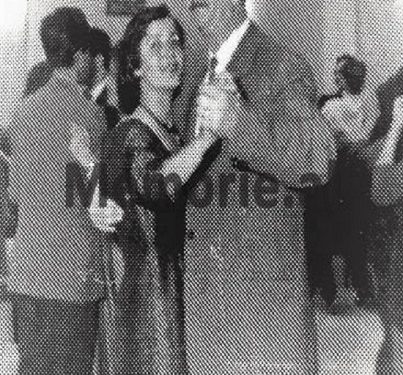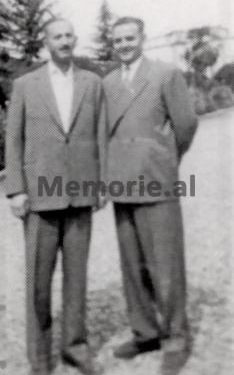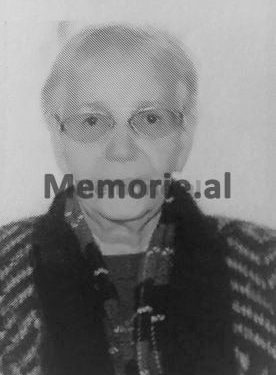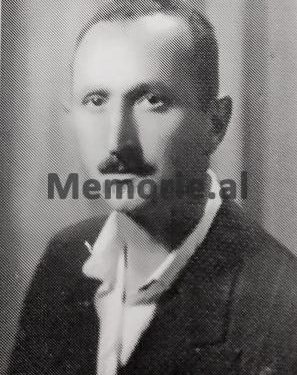Dashnor Kaloçi
Memorie.al/ publishes the unknown story of Natan Schachner, a doctor of Jewish origin who during the occupation was in the partisan ranks of Mehmet Shehu Brigade and after the war served as a doctor in several districts of the country such as: Kukës, Burrel, Shkodër, Krujë Durrës, etc. The story of his wife Mila Çorati Schachner about the mystery of his disappearance in the cells of the Internal Affairs Branch of Durrës in 1973 after two letters that had just arrived from London, informing him of the finding of his property in the Bank of Tel Aviv and State Security alibi….
On January 11, 1973, which coincided with the Republic Day, in our house in the city of Durrës, came about 12 Security civilians led by the Chairman of the Internal Affairs Branch of that time K.E. The moment they demonstratively entered the house, Nathan, who was playing backgammon with two of his friends, froze and did not say a word when they told him that “he was arrested on behalf of the people.” I was scared and immediately started shouting telling them that he had done nothing but one of them, a young boy named Vladimir Çuçi, very kindly found the moment and told me in Italian, that I should not speak. After Nathan was arrested, they conducted a thorough search of the entire house and took with him all his documents, as well as two books by my brother Agron Çorati, which he had written while in exile in Zvërnec. From the beginning of the search of the apartment, they went to the comedian and received two letters with envelopes which had come to Nathan in those days from London, where it was announced that his mother Berta’s property had been found in the Tel Aviv Bank. I was impressed that when they made the minutes of the seizure of documents, those two letters did not mark them at all “. The man who speaks for Memorie.al is Mila Schachner (Çorati), a former communist of the first hours and Head of Youth in the Second Brigade of Beqir Balluku, who tells the whole story of her husband of Israeli origin, Natan Schachner, who disappeared mysteriously from the State Security in 1973 in the cells of the Internal Affairs Branch of Durrës. Who is Mila Çorati and what is her past? How did she meet and marry the well-known doctor of Jewish origin, Natan Schancner, and how did he end up in Albania, after escaping being shot by the Germans in the Yugoslav internment camp? Why did Nathan leave as unwanted from the ranks of the Army, where he had served as a doctor since Mehmet Shehu’s First Brigade in 1943? What was his position regarding the Arab-Israeli conflict in 1966 and what did he say publicly at the wedding where he was called to his neighbors in the city of Durrës?! Why after that day he came under the strict surveillance of the State Security and what was said in the last two letters, which came to him from London? Why at the time of his arrest, the Security Officers immediately addressed those two letters and why did they not record them in the minutes of the seizure of the documents found on him?! What is the truth of the mystery of his disappearance from the cells of the Internal Branch of Durrës, where he was held for six months under torture and who is the man who testified that he saw Nathan’s body with a severed head, until the end of the 1980s in the Tirana morgue where medical students studied?
Mila Çorati’s story
Mila Schancher (Çorati), the wife of a well-known doctor of Jewish origin, until a few years ago lived completely alone with her sister Vanda (two or three years younger than her) in an old Tirana house. Although already in old age and with a health exhausted by the vicissitudes of a life full of suffering, she has told us the whole tragic story of her life. Erugina, or as she is known as Mila, was born in the city of Tirana in 1925, when her father Ferit Çorati, who worked at the PTT in Vlora, moved from there to the Capital. During the war years, her mother Feruzja, two brothers, Muharrem and Agron, as well as sister Vanda, all became associated with the anti-fascist movement and their home in Tirana became one of the most important communist bases, where the leaders were housed. of the SNP. After staying illegally for some time, Mila Çorati went to the mountains as a partisan, reaching the position of Youth Officer in the Second Brigade commanded by Beqir Balluku. After the end of the War she worked for some time in the Propaganda Directorate at the Ministry of Health and at that time she met Dr. Nathan Schachner, who would also become her future husband.
Mila’s marriage to Nathan
Regarding the acquaintance and marriage with Dr. Natan Schachner, Mila Çorati says: “In the years 1953-’54, during the period that I worked in the Propaganda Directorate of the Ministry of Health, I met for the first time Nathan, who at that time worked as a doctor in the town of Fushë-Krujë. Nathan was a very good man, very intelligent and quite humane, which distinguished him from all the other doctors who came to the Ministry for various problems. After the acquaintance we decided to get married, but Nathan was conditioned that if he did not change his citizenship, he would not be allowed to marry me. He was extremely upset by this, not only because he was proud of Moldova, where he was born and his Jewish origin, but also because he had no sympathy for the communists and the regime that had been established in Albania. Likewise, although he has many connections with Germany and Austria, where his family had lived for some time, he was allergic to the Nazism that had shot his father. Having no other choice, Nathan changed his citizenship and after that we were allowed to get married. At that time, I left Tirana and the Ministry of Health where I worked for several years and went to live with Nathan in Fushë-Krujë, at his apartment near the Bektashi Tekke, where he was housed in a large space. After we got married together, the state gave us a private apartment in the village of Arrameras in Fush-Kruja, and there we started building our lives. At the time, although Nathan was viewed with contempt and was not treated well by the communist regime, he was never in the habit of talking to anyone, either about the injustices done to him personally or about the communist regime that did not like him at all… Nathan smelled the attitude towards him and only on very rare occasions did he open up to me and talk to me against the communist regime. Although he was allergic to the regime we lived in, he never confused it with the common people and the inhabitants of those areas where he worked as a doctor, whom he served with the utmost correctness, going home to visit them and treated ”, said Mila Çorati, among others, about her acquaintance with her future husband, the doctor of Jewish origin, Natan Schachner.
Nathan’s mother dies in Fush-Kruja
During his years in Albania, after Nathan had learned of the tragic fate of his father who had been shot by German Nazis during World War II, he continued to be interested and seek information or news about the fate of his mother, Berta. , who had learned that he had been interned by the Germans in a concentration camp in Siberia. In this regard, Mila Çorati recalls: “In 1956, after 20 years had passed when Nathan had left his family to study in Bologna, Italy, where he graduated as a doctor, he received good news that he did to weep with joy. At that time, the Albanian Red Cross, through a telegram, informed Nathan to go to Durrës, to receive his mother Berta, who had departed by a steamer from the Soviet Union. This was made possible after Berta had addressed a letter to the number one leader of the Soviet Union, Nikita Khrushchev, and he had given her permission to come to Albania permanently. I cannot describe that meeting in the Port of Durres, when Nathan after 20 years hugged his mother, Berta. From that touching and heartbreaking meeting, all of us who had come out to wait for him, melted into tears. Nathan’s mother came and stayed with us for four or five months in the village of Arramerras in Fushë-Kruja, and then left for Romania where the family had lived years ago with her husband, Leon, and their son, Nathan. Before Bertha left for the place where her husband’s memories were, I often told Nathan to go and he and his mother to stay there forever. Nathan answered me that he did not know anyone in Romania, and here in Albania, at least the state had given him a job and they knew him as a doctor. After Nathan’s mother stayed in Romania for a while, she decided and returned to Albania, as no one received her there. In the small town of Fushë-Kruja, where Berta lived with us, in order not to be upset, Nathan regularly paid 3000 lekë per month to a person who knew the Russian language, who came home and chatted with his mother… After staying with us for almost two years, at the end of 1957, Nathan’s mother passed away in Fush-Kruja and we buried her in Tirana. Almost all the Jews living in Albania at that time came to her funeral ceremony. This ceremony took place in the Sharra cemetery on a plot that the Albanian state had left especially for the Jews who had died in Tirana “, Mila Çorati recalled regarding the arrival from Moscow and the death in Albania of her mother-in-law, Berta Schachner.
Nathan, in defense of Israel
Until 1960, the doctor of Jewish origin, Natan Schachner, together with his wife, Mila Çoratin, lived and worked in the village of Arramerras in Fushë-Kruja. In that year, they were given the right of transfer. Regarding this, Mila Çorati recalled: “After we had stayed for about seven years in the small town of Fushë-Kruja and after many requests, we were given the right to transfer to leave from there. After that we were sent to the city of Durrës, where they gave us accommodation by arranging us with houses in a building. For some time, Nathan was sent to work at the city hospital and then removed from there and taken to the Polyclinic. Although he continued to be quite orderly and very correct in his work, making a good name as a doctor in that city, (he followed his patients to Tirana), he was still looked down upon by the regime of that time. Nathan’s position and image in the eyes of the communist regime became extremely complicated and difficult after 1966 when the Arab-Israeli armed conflict broke out and war broke out between them. At that time, Nathan and I were invited to a wedding with a neighbor, and during the conversation we also talked about the war between Israel and Egypt, which at that time was the main point for all state propaganda. During that conversation, Nathan, defending his country Israel, opposed the interlocutors, who were told that Israel had not attacked Egypt, but he had waged a self-defense war. Seeing the situation that arose, I immediately intervened to soften the conversation and turned to Nathan telling him that he had never spoken like that. That was done to make him understand that he should not speak in that way anymore, as it was completely contrary to the official position of the state regarding the Arab-Israeli conflict. After that conversation, Nathan was reported to the Internal Affairs Branch and from that day on a permanent State Security surveillance was launched against him. In a case when he was hospitalized sick in Tirana, the Security intervened by removing him from the hospital on the pretext that he had nothing and was simulating himself “, Mila Çorati recalled, adding that at that time Nathan and he were followed everywhere.
Nathan arrested in January 1973
While Nathan’s mother was in Albania, she had told him that her family’s wealth, which was summed up in a large amount of gold jewelry, had been left in storage by a relative before she left. from Moscow. Nathan was able to contact his cousin who at the time was working at the Israeli Consulate in London and he brought him two letters explaining that he had deposited his mother’s property in the Tel Aviv Bank and would initially send it a television. A few days after receiving those letters, on January 11, 1973, Nathan was arrested by the State Security. Regarding this, Mila Çorati said: “On the day that was the Republic Day, in our house in the city of Durrës, 12 Security officers came together with the President of the EC Branch. At the moment they demonstratively entered, Nathani, who was playing backgammon with two of his friends, froze in place and did not say a word when they communicated to him that on behalf of the people he had been arrested. I got scared and started screaming saying he had done nothing. But one of them, a young boy named Vladimir Çuçi, who stood out from the rudeness of his colleagues, found the moment and very kindly told me in Italian not to speak anymore. After Nathan was put on the irons, they did a thorough check of the whole house and the first thing they got were the two letters that had just arrived in those days from London, from Nathan’s cousin. I was impressed that during the minutes they made for the sequestration of the documents (where they also marked the books in handwriting of my brother Agron who had written them in exile in Zvërnec) those two letters were not marked. During those six months that Nathan stayed in the investigation, I was called several times and asked about everything about him. I was once told to sign up for what they had written after giving it to me to read. I signed in good faith one of the sheets, as the writing was not read at all and I could not see well with my eyes. When I got home, I told my brother Agron, who told me that I had made the mistake of signing, as they had specially made the writing in such a way that I could not read it. The next day they came to my house and told me that they had rushed the day before and I had to sign the other sheets as well. I told them to read what they had written and when I saw that they had written differently from what I had spoken, I started shouting and they took me to the K.E. Branch President. I told him I did not want to sign because those machinations had not been done by the fascists when they arrested me in 1943. He hit me with his hands and I fell to the ground “, Mila Çorati recalled at the time when her husband Natani was arrested, adding that since there was no fact and argument to convict her, the Security pressured her to testify against him./Memorie.al
Continues tomorrow















